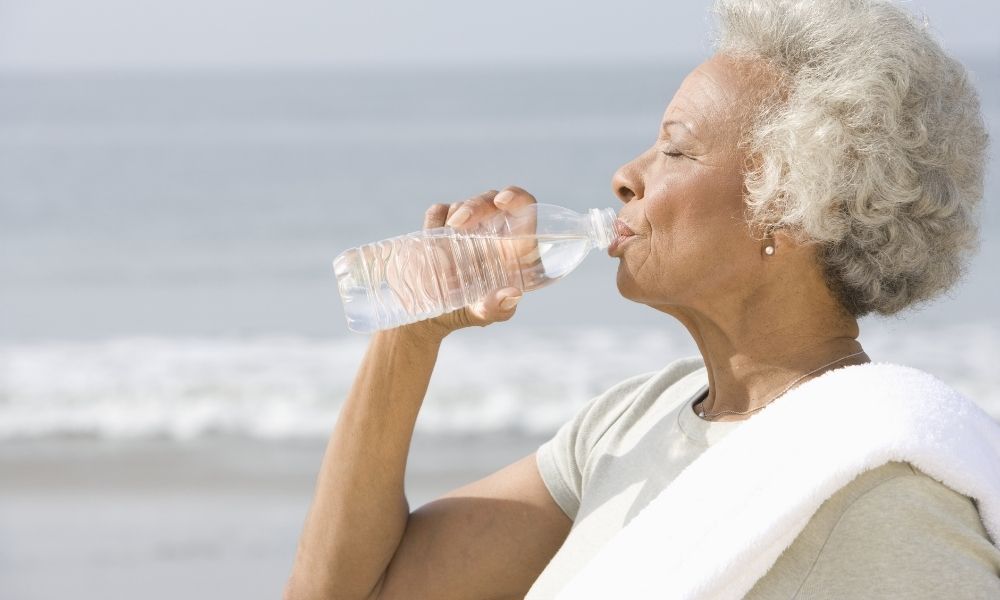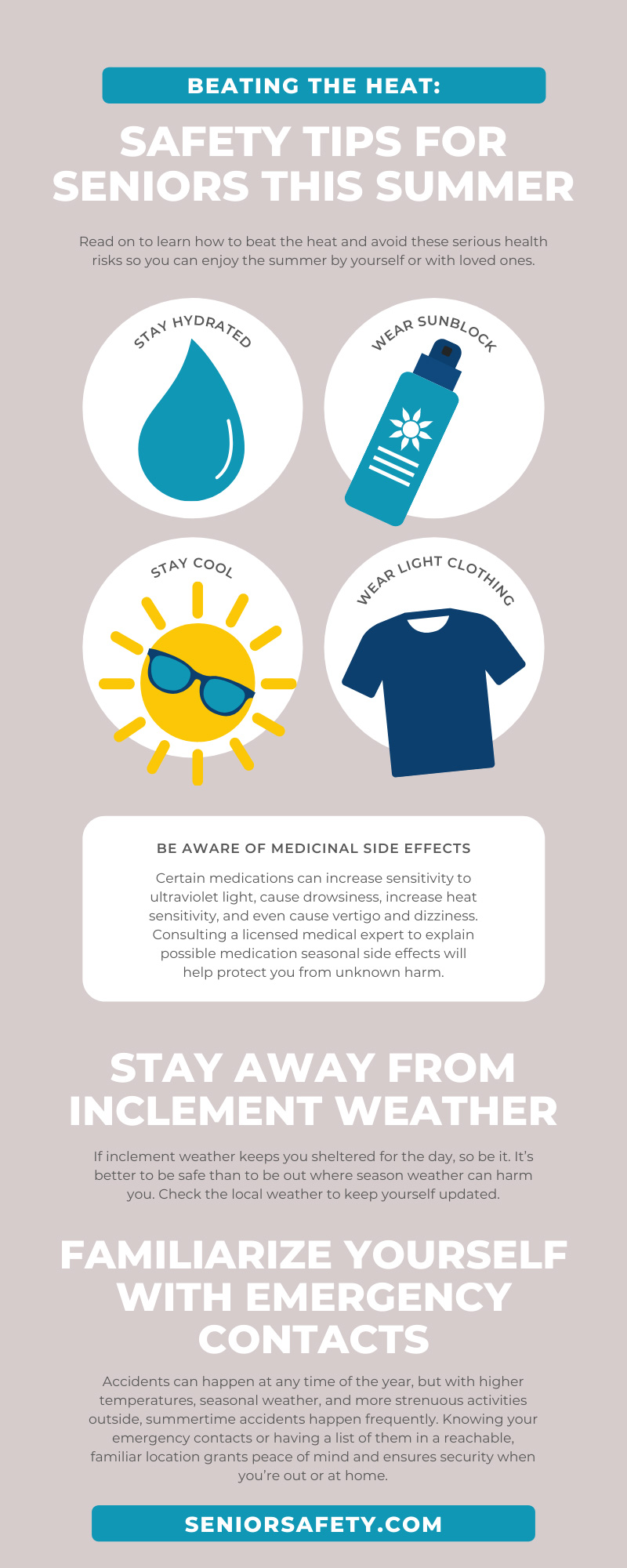 Summertime is one of the best moments in the year for seniors to relax, breathe, and enjoy the outdoors. Hiking, golf, swimming, reading, watching a movie, or simply talking outside with a friend are all common activities seniors can do to enjoy the season. However, like at any time, summer has its risks. The risk of hyperthermia, dehydration, sun poisoning, fatigue, and medicinal side effects worsens during this time due to the warmer climate, frequent sun exposure, and higher temperatures. Fortunately, this guide on beating the heat: safety tips for seniors this summer will help keep you safe. Read on to learn how to beat the heat and avoid these serious health risks so you can enjoy the summer by yourself or with loved ones.
Summertime is one of the best moments in the year for seniors to relax, breathe, and enjoy the outdoors. Hiking, golf, swimming, reading, watching a movie, or simply talking outside with a friend are all common activities seniors can do to enjoy the season. However, like at any time, summer has its risks. The risk of hyperthermia, dehydration, sun poisoning, fatigue, and medicinal side effects worsens during this time due to the warmer climate, frequent sun exposure, and higher temperatures. Fortunately, this guide on beating the heat: safety tips for seniors this summer will help keep you safe. Read on to learn how to beat the heat and avoid these serious health risks so you can enjoy the summer by yourself or with loved ones.
Stay Hydrated
Summer weather is some of the most relaxing, rejuvenating natural energy boosters you can enjoy. Many people find that they’re most productive in the summertime given the warm climate, natural sunlight, and higher temperatures. Even people living in rainy or mountainous climates find summer especially fulfilling, given the scenic nature of their location. Still, wherever you are, anyone over the age of 50 must be aware of their water intake. The human body needs water to survive, and when people fail to sustain enough water in their systems, it can lead to dehydration. Watch out for excessive vomiting, sweating, diarrhea, fever, dark urine, constipation, and lightheadedness. These are all symptoms of mild and severe dehydration.
Wear Sunblock
Relatedly, sunburns are no joke. The summer sun might feel good for those who don’t get out much, but too much exposure has its share of issues too. As your body defends itself against UV rays, it weakens over time leading skin cells to die or damage. Overexposure to UV radiation could develop skin cancer. It could also lead to sun poisoning, or severe sunburn, in addition to causing dehydration, nausea, fever, redness, dizziness, and potentially fainting. Wear sunblock when outside to avoid these issues. Seniors should use a sunscreen with SPF 30 or higher, as this absorbs 97% of UV radiation. Remember to reapply throughout the day the longer you remain outside.
Stay Cool
Hyperthermia, also known as heatstroke, occurs when the body’s internal temperature rises too high after long periods of exposure to heat. Heatstroke is a clear sign of hyperthermia that senior adults must remember. Sweating is the first and most obvious sign your internal body temperature is climbing. Likewise, dizziness, muscle weakness, nausea, excessive thirst, and headaches might follow. Of course, heat fatigue, fainting, and heat exhaustion are related stages of hyperthermia. Whichever the case, it is crucial to remain cool and hydrated. When at any time you feel too warm, drink fluids with electrolytes and move to an air-conditioned building. If you still feel warm, apply a cool, wet towel to your forward and remain sitting until you feel cooled down.
Wear Light Clothing
Although a night on the town during the summertime might beckon for a nice suit or dress, wearing too heavy clothes increases your risk of summer-related issues. As previously mentioned, wearing too heavy clothes increases internal body temperature and might lead to heatstroke or hyperthermia, especially if you’re outside. Alternatively, it might dehydrate you as you continuously sweat in heavy-set clothes. Therefore, you should opt for light, loose-fitted clothing during summer. These will keep you cool and mobile as you move around outside. While it’s okay to dress up from time to time, wear light clothing for most encounters to avoid exposing your body to heat-related issues.
Be Aware of Medicinal Side Effects
Consult your doctor or pharmacist if your daily medications have potential seasonal side effects. Safe medicinal consumption is one of the top safety tips for seniors this summer, given the potential risks involved. Certain medications can increase sensitivity to ultraviolet light, cause drowsiness, increase heat sensitivity, and even cause vertigo and dizziness. Consulting a licensed medical expert to explain possible medication seasonal side effects will help protect you from unknown harm. They may prescribe a new medication if your current one has side effects impeding your daily activities.
Stay Away From Inclement Weather
Depending on where you live, seasonal weather might be temperate, or it might be inclement. While a light rainstorm is nothing to fear, an inclement thunderstorm is. Not to mention, summer is typical hurricane or tornado season if you live in those areas. The severity of season weather determines your safety for the day. This could impact your daily rituals. Don’t forget your safety is the number one importance. If inclement weather keeps you sheltered for the day, so be it. It’s better to be safe than to be out where season weather can harm you. Check the local weather to keep yourself updated.
Familiarize Yourself With Emergency Contacts
It’s also a good idea to memorize emergency contacts, if you can, or keep them in a familiar location. Accidents can happen at any time of the year, but with higher temperatures, seasonal weather, and more strenuous activities outside, summertime accidents happen frequently. Knowing your emergency contacts or having a list of them in a reachable, familiar location grants peace of mind and ensures security when you’re out or at home. These can be family members, doctors, first responders, friends, or trusted neighbors. Having a stable support system around you reduces stress and anxiety that come with summertime safety.
Alternatively, keep a medical alert system at home and on-hand for fast, convenient coverage anytime, anywhere. At Senior Safety Medical Alert Systems, we manufacture our medical alert systems with your safety in mind. Our medical alert systems with landlines have 24-hour coverage connected straight to your landline, eliminating internet connectivity issues for faster, more efficient coverage. With 1000 feet of range, you’re free to move about your home or on the outer perimeters with ease. If you don’t have a landline, that’s okay. We offer landline-free home alert systems with two-way communication to help you in any emergency. We also offer a mobile medical alert system so that you can travel wherever you want to go without feeling anxious about potential accidents. Call now to speak to a home alert specialist and learn more about how home medical alert systems are right for you.









